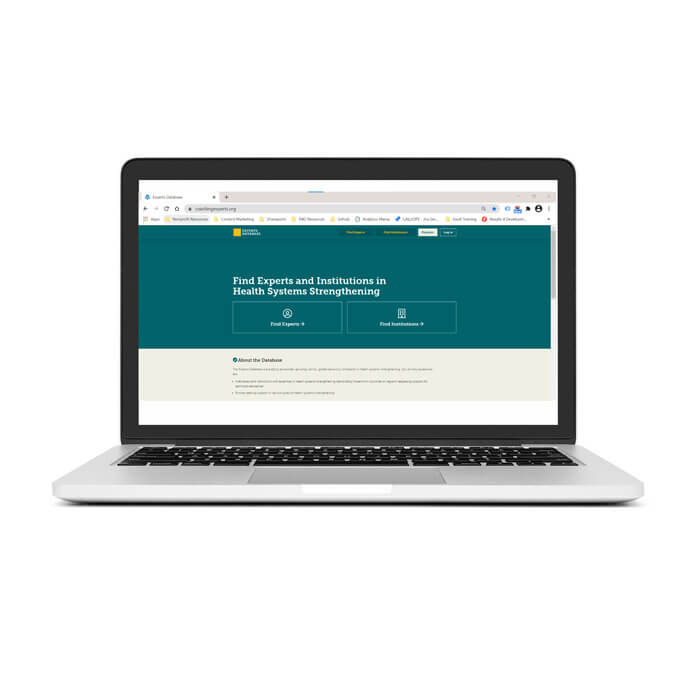Raising the visibility of health systems experts from around the globe
Last month, we launched a new platform — The Experts Database — for health financing and health systems strengthening experts based in low- and middle-income countries (LMICs). The platform was designed to be similar to LinkedIn — where experts and institutions could advertise their skillsets and experience and, in turn, make connections and find new opportunities— but with a particular goal to elevate the visibility of experts from LMICs.
The platform also makes it easier for donors and implementers to source individuals with the right set of skills and contextual experience to respond to their specific needs. Those searching for health systems experts and institutions can filter by a range of criteria, including by areas of geographic and technical expertise and years of experience, and can directly message experts on the database to signal interest. Those health professionals who would like to be featured on the database can quickly join the pool of experts by completing work history and uploading their CV, quickly gaining access to new opportunities.
We encourage those seeking sustained coaching and mentoring support and those interested in providing such support to visit https://coachingexperts.org to learn more.
Why now?
For far too long, global health technical assistance has prioritized the expertise of high-income countries and donors, even as local expertise and capacity has grown in the countries and regions requesting technical support. Shifts in mindset, resources, and power are needed to make sure that expertise from LMICs is recognized, valued, and engaged to solve health system challenges all across the globe. We think making expertise visible is a first but important step.
R4D and the Strategic Purchasing Africa Resource Center (SPARC) co-developed The Experts Database against this backdrop and amid growing calls to decolonize global health and development.
As has been well chronicled, technical assistance has historically not been contextualized to reflect the political economy of LMICs, nor has it been provided by those who are from countries receiving such support. The long-overdue reckoning around who is considered an expert and how development assistance is delivered is the product of sustained advocacy by those directly affected by this outdated and harmful paradigm serving as the primary catalyst.
Having worked in international development for many years and witnessed or participated in engagements with varied levels of local leadership and engagement, we are encouraged by this re-imagination of technical assistance. Not only because it is the right thing to do, but also because such a model will produce better outcomes (after all, it stands to reason that local actors are best equipped to identify levers for improvement). Our hope is that such a shift also portends broader redistribution of global resources and concentration of wealth.
But disrupting the status quo — especially where there are strong incentives for current power holders not to change — can be challenging. And at R4D, we are interested in seeing whether bold rhetoric in our field will translate to bold action. Will INGOs remain committed to these principles if doing so implies reduced funding for them? How will donors respond if their agendas differ from locally-driven ones? Can we really have faith that high-income countries will cede resources and influence?
At R4D, we have been wrestling with the complexity of how we can best contribute to the aim of locally-led development. We come at this question humbly, recognizing the ways in which we may have contributed to power imbalances. Yet, we also believe that, having listened to the country change agents with whom we work, there are concrete — even if incremental — ways in which we can support this transformation.
At R4D, we have evolved in important ways. Once a nearly-exclusively Washington, DC-based organization, we now have offices across multiple countries, each with local leadership and staff. Our management team increasingly resembles those who are in the countries in which we work. We have explicitly articulated a commitment to combatting long-standing patterns of colonialism and racism. More and more, we are working in partnership with, and in some instances as subcontractors to, regional organizations in LMICs.
We are increasingly orienting our work with partner countries to align with what we call the “coaching approach.”
At the heart of the coaching approach is a move toward models of supporting long-term systems change by drawing upon country and regional experts. By implication, this approach eschews the fly-in, fly-out modality of doing development. As part of our coaching approach, we have developed a series of open-source e-modules to train individuals on the skills necessary to perform effective coaching and mentoring. This includes two new modules, on the topics of virtual coaching and process facilitation, to be released early this year. These modules will help advance knowledge on the “how” of coaching.
To also reshape the “who” of coaching, it is important that we find ways to interrupt the current paradigm of technical assistance. It is often the case that the same set of experts are tapped to provide health systems strengthening assistance, despite the fact that there is a growing pool of people in low- and middle-income countries with relevant expertise. This creates a reinforcing cycle in which a small set of individuals garner more and more experience and are therefore better positioned to take on assignments. We hope the Experts Database will be a small step to help break this cycle.
No one platform or innovation will immediately reverse entrenched patterns of development. However, by providing an easy means of brokering coaching and support, we hope The Experts Database will elevate the visibility and profile of the impressive pool of experts from a much wider range of countries and contribute to a broader democratization of who may support efforts to build sustainable health systems.














